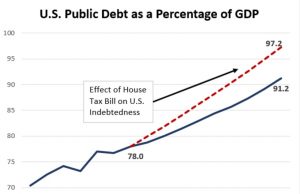I first worked on Capitol Hill in 1966 when I was only 19. Partisanship could be intense in that era but the majority of people in both parties wanted to see government work and recognized that high quality government investments could benefit all sectors of society.
Over the ensuing 5 decades, however, the tenor of American public debate has shifted dramatically. A relatively small group of wealthy individuals and political activists have become increasingly dominant in the affairs of one of the two major parties and they have focused on a single objective, a dramatic retrenchment in the role of government. The public debate has shifted from “how to make government better” to whether we need government at all.
Despite the high decibel level of that debate it has resulted in producing little common ground between the opposing ideologies or in fact much change in the overall level of government activity relative to the size of the country and the American economy.
But it has generated profound changes in the quality and direction of government. It has contributed to both the reckless growth of public debt and declining level of public investment in the things needed to foster prosperity in the coming decades. It has fostered destructive policies that led to government shutdowns; threats to abandon government commitments to repay lenders and the frequent denigration of highly skilled and critically important public servants.
In short, this is a fight that only serves the interests of those who wish ill for the nation’s future.
The objective of this website is to strip away the ideologies surrounding this debate and look for common ground for building a far broader consensus about what we Americans should want and expect from our government.
Much of the content will be essays written by myself but I will also be looking for other content that I believe readers who are interested in this topic would find important. I am hoping to help build a community that has grown tired of the old arguments and hope to see their countrymen united around at least a few solid principles to frame a new area of public discourse and decision making.
Editor: R Scott Lilly
Scott Lilly has been writing about public policy for more than four decades. He is widely viewed as one of the leading experts on the federal budget process and the impact of changes in federal spending policy on local communities, national security and the economy. For 31 years, he worked as a Congressional staffer during which time he directed the staffs of the Joint Economic Committee, the Democratic Study Group and the House Appropriations Committee. He has traveled widely probing the effectiveness of government programs across the U.S. and overseas.
For more than 10 years he was a Senior Fellow at the Center for American Progress. He has served as an Adjunct Professor of Public Policy at both the LBJ School of Public Policy, University of Texas and the Georgetown University of Public Policy. He has testified before numerous Congressional committees and has been a guest on CBS, CNN, Fox News, MSNBC and various other television and radio networks. He has been frequently quoted in the Washington Post, the New York Times, the Los Angeles Times, the Chicago Tribune and other major newspapers.






